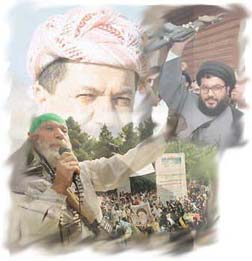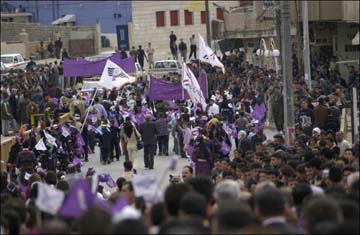northern Iraqi provinces.  At the time of the formal request in 1994, the Ancient Church of the East did not have any Bishop-level presence in all of northern Iraq. Mr. Abdul Hameed Adil Yazdeen’s refusal to grant permission to build the Assyrian Church center has since been repeatedly upheld by certain KDP leadership till today such that 8 years later, the Ancient Church of the East is still not able to properly minister to its adherents.
At the time of the formal request in 1994, the Ancient Church of the East did not have any Bishop-level presence in all of northern Iraq. Mr. Abdul Hameed Adil Yazdeen’s refusal to grant permission to build the Assyrian Church center has since been repeatedly upheld by certain KDP leadership till today such that 8 years later, the Ancient Church of the East is still not able to properly minister to its adherents.
A local Assyrian resident, who recently fled the area with his family, speaking on condition of anonymity, stated: “Why do you think we left? I pray to God that the day would not come that these gangs are given power in Northern Iraq. Such actions are even worse than that of the dictator Saddam! At least we are allowed to have a bishopric under his rule.” The KDP’s refusal to allow the building of an Assyrian Bishop’s center was supposedly based on several factors. First, either purposely or ignorantly, Mr.Yazdeen erroneously asserted that the Ancient Church of the East already had such a center in the area of Barwari Bala. In fact, the Ancient Church of the East has no such center whatsoever anywhere in northern Iraq. Rather, the center in Barwari Bala belongs to the Assyrian Church of the East, an eccliastically distinct Assyrian Church. This point was repeatedly clarified to the KDP tribal cheiftains in the course of the request for permission to build the religious center. In either event, the egregious assumption that a KDP tribal appointee could better assess than the Church community itself whether the Church had sufficient facilities to minister to the spiritual needs of its members is in its own right arrogant and deeply disturbing.
Rather than use the earmarked funds for the Church project, Mr. Yazdeen suggested instead that other non Assyrian Christian projects be considered including ” a scientific college, an orphanage, a martyr’s center, or a health center which is more preferable in the present circumstances of Kurdistan.”
Most disturbing, though, remains Mr. Yazdeen’s allegation that the building of an Assyrian religious site in the ancient Assyrian city would anger neighboring Muslims and flare religious tensions. According to Mr. Yazdeen, “The site chosen for the bishopric headquarters is close to Muslim mosques and is located within their modern residential areas. This situation will create religious sensitivity.” The ultimate affront to any sense of tolerance remains Mr. Yazdeen’s last point wherein he states bluntly and unapologetically that “Islamic law (Shari’a) does not justify the creation of a church in an Islamic country”. Regrettably, such Islamic fundamentalism has steadily
increased within the KDP and has been spearheaded by the Hizballah party led by Sheikh Mohammed Khalid Barzani, KDP stongman Mr. Masoud Barzani’s father-in-law (AINA, 5-24-2002).
 Since the Gulf War and the ensuing establishment of the UN “Safe Haven”, the KDP and other similar paramilitary organizations, have taken advantage of their earlier international sympathy as victims of the Iraqi regime to consolidate their occupation of northern Iraq. A deliberate and concerted campaign of assassinations, abductions, torture, land expropriations and religious discrimination have been used to successfully terrorize Assyrians in their ancient homeland. The KDP in particular has regularly utilized its tribal relationship with the Hizballah as well as other Islamic fundamentalist organizations to raise tensions against the Assyrian Christian community in a bid to further intimidate Assyrians into abandoning their villages. Seen solely for its face value, the letter refusing building of an Assyrian bishopric is ample evidence of the KDP’s usurpation of indigenous Assyrians’ fundamental right to practice the historic Christian faith of their forefathers within the ancient and historic heartland of Assyria. When seen in the wider context of the decade long terror campaign against Assyrians in northern Iraq, the newly released letter is another important piece of evidence tying the KDP leadership to the persistent, deliberate, and systematic persecution of Assyrians.
Since the Gulf War and the ensuing establishment of the UN “Safe Haven”, the KDP and other similar paramilitary organizations, have taken advantage of their earlier international sympathy as victims of the Iraqi regime to consolidate their occupation of northern Iraq. A deliberate and concerted campaign of assassinations, abductions, torture, land expropriations and religious discrimination have been used to successfully terrorize Assyrians in their ancient homeland. The KDP in particular has regularly utilized its tribal relationship with the Hizballah as well as other Islamic fundamentalist organizations to raise tensions against the Assyrian Christian community in a bid to further intimidate Assyrians into abandoning their villages. Seen solely for its face value, the letter refusing building of an Assyrian bishopric is ample evidence of the KDP’s usurpation of indigenous Assyrians’ fundamental right to practice the historic Christian faith of their forefathers within the ancient and historic heartland of Assyria. When seen in the wider context of the decade long terror campaign against Assyrians in northern Iraq, the newly released letter is another important piece of evidence tying the KDP leadership to the persistent, deliberate, and systematic persecution of Assyrians.
In concluding his letter, Mr. Yazdeen notes that copies of the letter have been circulated to all of the mosques in the region as well as the Union of Islamic Ulama in Kurdistan in order to further mobilize Islamic fundamentalist fervor against any Assyrian attempt to appeal the decision. As evidenced in the letter, stoking Islamic fundamentalist threats has remained atried and true instrument of terror of the KDP and Hizballah.Such mounting evidence directly linking specific leaders and policies targeting Assyrians may one day prove indispensable in the event of any inquiries by an international criminal court.
 Assyrian Democratic Organization ADO
Assyrian Democratic Organization ADO






